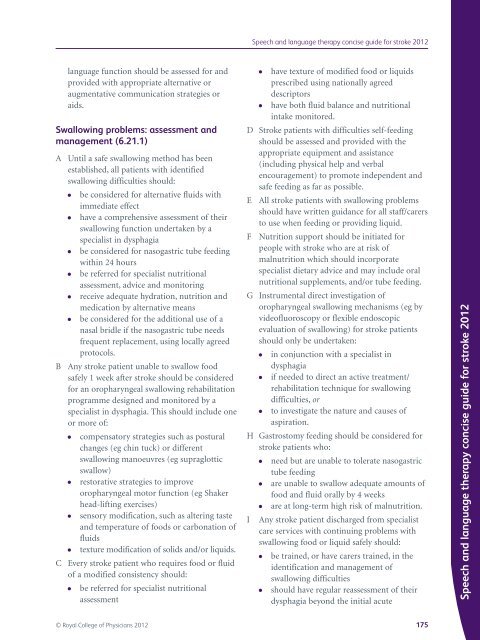national-clinical-guidelines-for-stroke-fourth-edition
national-clinical-guidelines-for-stroke-fourth-edition
national-clinical-guidelines-for-stroke-fourth-edition
You also want an ePaper? Increase the reach of your titles
YUMPU automatically turns print PDFs into web optimized ePapers that Google loves.
language function should be assessed <strong>for</strong> and<br />
provided with appropriate alternative or<br />
augmentative communication strategies or<br />
aids.<br />
Swallowing problems: assessment and<br />
management (6.21.1)<br />
A Until a safe swallowing method has been<br />
established, all patients with identified<br />
swallowing difficulties should:<br />
● be considered <strong>for</strong> alternative fluids with<br />
immediate effect<br />
● have a comprehensive assessment of their<br />
swallowing function undertaken by a<br />
specialist in dysphagia<br />
● be considered <strong>for</strong> nasogastric tube feeding<br />
within 24 hours<br />
● be referred <strong>for</strong> specialist nutritional<br />
assessment, advice and monitoring<br />
● receive adequate hydration, nutrition and<br />
medication by alternative means<br />
● be considered <strong>for</strong> the additional use of a<br />
nasal bridle if the nasogastric tube needs<br />
frequent replacement, using locally agreed<br />
protocols.<br />
B Any <strong>stroke</strong> patient unable to swallow food<br />
safely 1 week after <strong>stroke</strong> should be considered<br />
<strong>for</strong> an oropharyngeal swallowing rehabilitation<br />
programme designed and monitored by a<br />
specialist in dysphagia. This should include one<br />
or more of:<br />
● compensatory strategies such as postural<br />
changes (eg chin tuck) or different<br />
swallowing manoeuvres (eg supraglottic<br />
swallow)<br />
● restorative strategies to improve<br />
oropharyngeal motor function (eg Shaker<br />
head-lifting exercises)<br />
● sensory modification, such as altering taste<br />
and temperature of foods or carbonation of<br />
fluids<br />
● texture modification of solids and/or liquids.<br />
C Every <strong>stroke</strong> patient who requires food or fluid<br />
of a modified consistency should:<br />
● be referred <strong>for</strong> specialist nutritional<br />
assessment<br />
Speech and language therapy concise guide <strong>for</strong> <strong>stroke</strong> 2012<br />
● have texture of modified food or liquids<br />
prescribed using <strong>national</strong>ly agreed<br />
descriptors<br />
● have both fluid balance and nutritional<br />
intake monitored.<br />
D Stroke patients with difficulties self-feeding<br />
should be assessed and provided with the<br />
appropriate equipment and assistance<br />
(including physical help and verbal<br />
encouragement) to promote independent and<br />
safe feeding as far as possible.<br />
E All <strong>stroke</strong> patients with swallowing problems<br />
should have written guidance <strong>for</strong> all staff/carers<br />
to use when feeding or providing liquid.<br />
F Nutrition support should be initiated <strong>for</strong><br />
people with <strong>stroke</strong> who are at risk of<br />
malnutrition which should incorporate<br />
specialist dietary advice and may include oral<br />
nutritional supplements, and/or tube feeding.<br />
G Instrumental direct investigation of<br />
oropharyngeal swallowing mechanisms (eg by<br />
videofluoroscopy or flexible endoscopic<br />
evaluation of swallowing) <strong>for</strong> <strong>stroke</strong> patients<br />
should only be undertaken:<br />
● in conjunction with a specialist in<br />
dysphagia<br />
● if needed to direct an active treatment/<br />
rehabilitation technique <strong>for</strong> swallowing<br />
difficulties, or<br />
● to investigate the nature and causes of<br />
aspiration.<br />
H Gastrostomy feeding should be considered <strong>for</strong><br />
<strong>stroke</strong> patients who:<br />
● need but are unable to tolerate nasogastric<br />
tube feeding<br />
● are unable to swallow adequate amounts of<br />
food and fluid orally by 4 weeks<br />
● are at long-term high risk of malnutrition.<br />
I Any <strong>stroke</strong> patient discharged from specialist<br />
care services with continuing problems with<br />
swallowing food or liquid safely should:<br />
● be trained, or have carers trained, in the<br />
identification and management of<br />
swallowing difficulties<br />
● should have regular reassessment of their<br />
dysphagia beyond the initial acute<br />
© Royal College of Physicians 2012 175<br />
Speech and language therapy concise guide <strong>for</strong> <strong>stroke</strong> 2012


